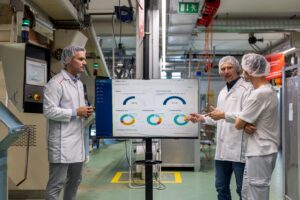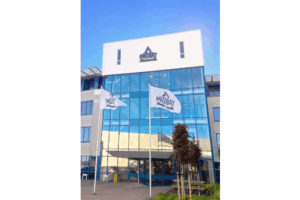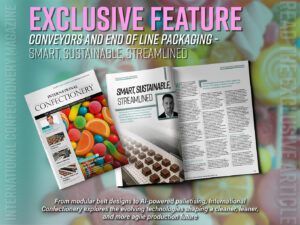Circe Bioscience is transforming the confectionery industry by using innovative microbial engineering to convert CO2, water and electricity into sustainable, cost-effective oils and fats
Could you introduce yourself and tell us a bit about your role at Circe Bioscience?
I’m Shannon Nangle, the CEO and Co-founder of Circe Bioscience. My background is in biology and I developed our core technology during my post doctorate at Harvard. What we do at Circe Bioscience is engineer microbes to convert CO2, water and electricity into valuable products. We’re particularly focused on producing triglycerides, which are the fats, butters and oils found in plants and animals. Our main goal right now is to create sustainable substitutes for palm oil and cocoa butter, specifically for use in the confectionery industry.
How did you get started on this journey? What inspired you to develop such groundbreaking technology?
The journey started with a deep interest in the potential of biology as a tool for solving industrial challenges. Throughout my studies, I was always fascinated by the biochemical processes that sustain life on Earth. It struck me that biology itself could be harnessed as a technology to address some of the pressing issues we face, particularly in terms of sustainability. While completing my postdoc at Harvard, I was increasingly drawn to the idea of applying biological principles to industrial processes, rather than just understanding them in an academic setting. The potential to use microbes in ways that could revolutionise industries was incredibly inspiring to me. It became clear that technologies like this could not only exist but should exist if we’re to support human flourishing in a sustainable way. That’s what led me to co-found Circe Bioscience, and it’s been an exciting challenge ever since.
That’s an incredible origin story. Can you explain how your process of using gas fermentation differs from traditional fermentation methods used in food production?
Traditional fermentation typically involves using plant-based feedstocks, like grains or sugar, which microbes then transform into products like alcohol or other chemicals. Our process is quite different. Instead of starting with plant material, we use gases—specifically CO2, water, and electricity. The electricity splits water into oxygen and hydrogen, and these gases are then fed directly to our engineered microbes. You can think of our process as having three stages: it starts with a soda carbonation process, moves through a brewery-like phase, and ends with a refining process like a palm oil refinery. One of the biggest advantages of this method is its sustainability. We have almost no carbon footprint, and the process can even be carbon-negative. We use very little water, and there’s minimal land use involved, which is a huge benefit compared to traditional methods. This allows us to create triglycerides—essentially the same fats and oils that are already used in the food industry—but with much greater efficiency and far less environmental impact.
How does your approach impact the sourcing of ingredients specifically for the confectionery industry?
When we focus on ingredients like cocoa butter and palm oil, one of the biggest advantages is our minimal resource footprint. Deforestation, which is a major issue with traditional sourcing, isn’t a concern for us. Our process not only reduces the environmental impact but also allows us to create more functional alternatives that are tailored for specific confectionery applications. We can produce drop-in replacements, but we can also offer customised, highly functional alternatives that meet the specific needs of confectioners. This means that not only can we reduce the negative impact associated with traditional ingredient sourcing, but we can also improve the quality and functionality of the ingredients themselves. It’s a win-win for both the environment and the industry.
Never miss a story… Follow us on:
![]() International Confectionery
International Confectionery
![]() @InConfectionery
@InConfectionery
![]() @InConfectionery
@InConfectionery
Media contact
Hannah Larvin
Editor, International Confectionery
Tel: +44 (0) 1622 823 920
Email: [email protected]








